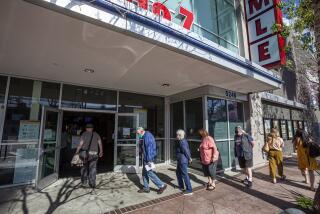Albert Maysles, acclaimed director of ‘Grey Gardens,’ dies at 88
- Share via
Albert Maysles, the influential filmmaker behind movies such as “Grey Gardens” and “Gimme Shelter,” died Thursday, according to the Associated Press. He was 88.
Maysles was known for championing a fly-on-the-wall style of moviemaking. Along with his late brother David, who died in 1987, he was keen on putting the camera at an intimately close distance and letting the subject unfurl itself.
His movies, such as 1970’s “Shelter,” about an eventful Rolling Stones tour, and, “Gardens,” about a pair of eccentric Bouviers on Long Island, demonstrated these tactics, as did later work such as “The Gates” and the 2001’s “LaLee’s Kin” (the latter was nominated for a documentary Oscar). Albert Maysles often collaborated with younger filmmakers on recent movies, co-directing or serving as its cinematographer and spirit guide.
Maysles died at his home in Manhattan, the AP said.
Although Maysles’ style of verite was highly unusual in the documentary realm when he began, it came to inform a host of nonfiction cinema that followed, and in many ways laid the groundwork for the reality-television era.
Maysles had continued working well into his 80s, and as recently as a few months ago was giving classes and attending events on both coasts as well as in Europe. He would still regularly come into the Harlem offices of the documentary center he founded, developing new movies and guiding a group of proteges.
Maysles’ latest movie, “Iris,” had its premiere at the New York Film Festival last fall and will open in April. The doc looks at the nonagenarian fashion icon Iris Apfel, a maverick spirit who, like its director, has maintained a prolific work pace even at an older age. His long-awaited “In Transit,” a film he co-directed that captures strangers on long-distance trains, was just announced as a Tribeca Film Festival premiere when the gathering kicks off next month.
In an interview with The Times in October, Maysles described his documentary approach, which was said to be as much emotional and empathetic as formal.
“People always say ‘Love Thy Neighbor’ but we never say ‘Meet Thy Neighbor,’” he said. “How many wars would we have fought if we could have met a single member of the family we were fighting against?”
Twitter: @ZeitchikLAT
More to Read
Only good movies
Get the Indie Focus newsletter, Mark Olsen's weekly guide to the world of cinema.
You may occasionally receive promotional content from the Los Angeles Times.









